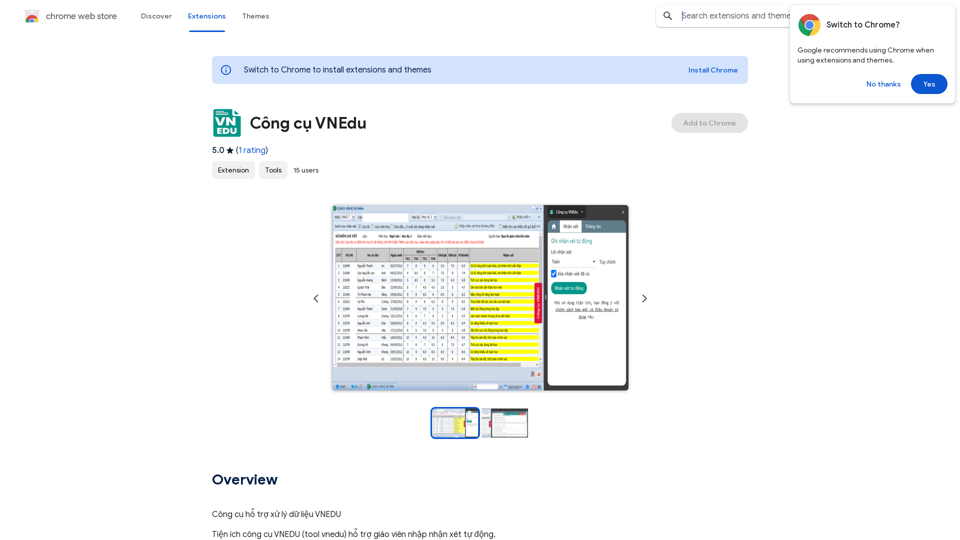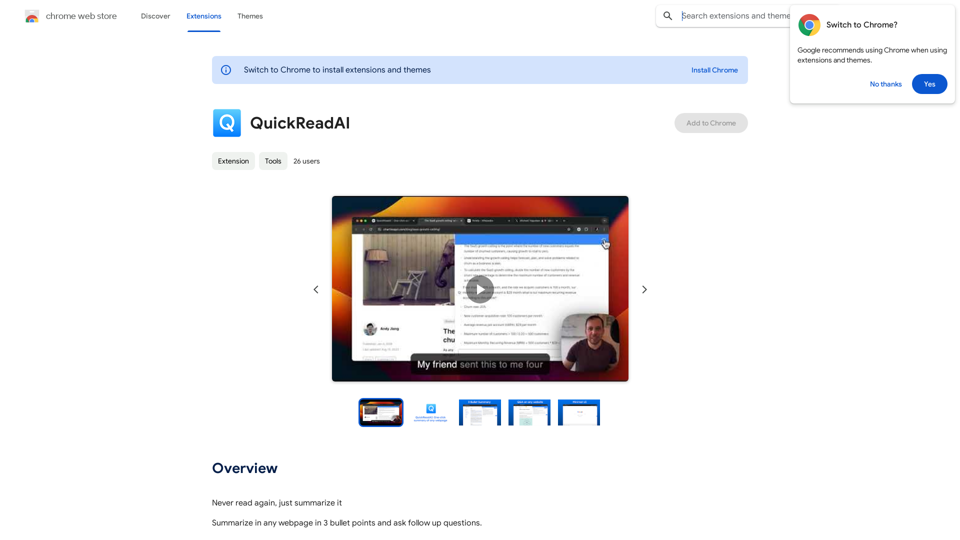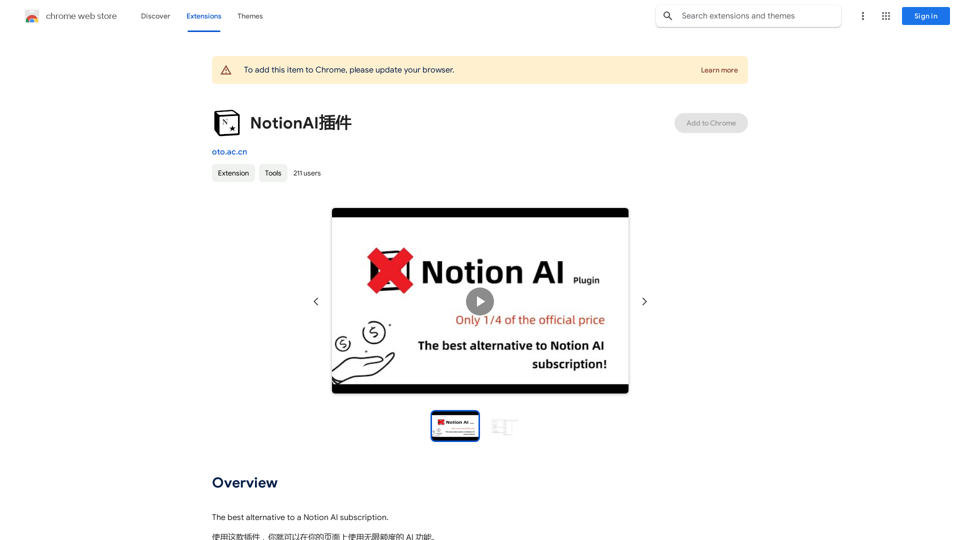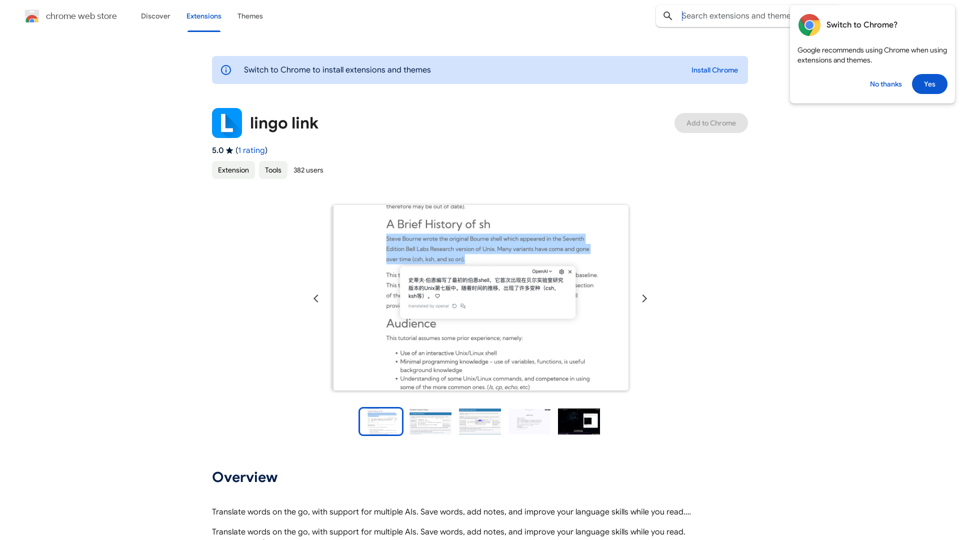Deepgram AI Transcription Tool is a free online platform that converts audio content into text. It supports over 30 languages and dialects, making it versatile for various users including students, journalists, podcasters, and professionals. The tool uses advanced AI technology to ensure accurate and reliable transcriptions, and offers an easy-to-use interface for a seamless experience.
Free Transcription Tool | Deepgram
Easily convert your conversations, audio files, or YouTube videos into text for free with our advanced transcription tool.
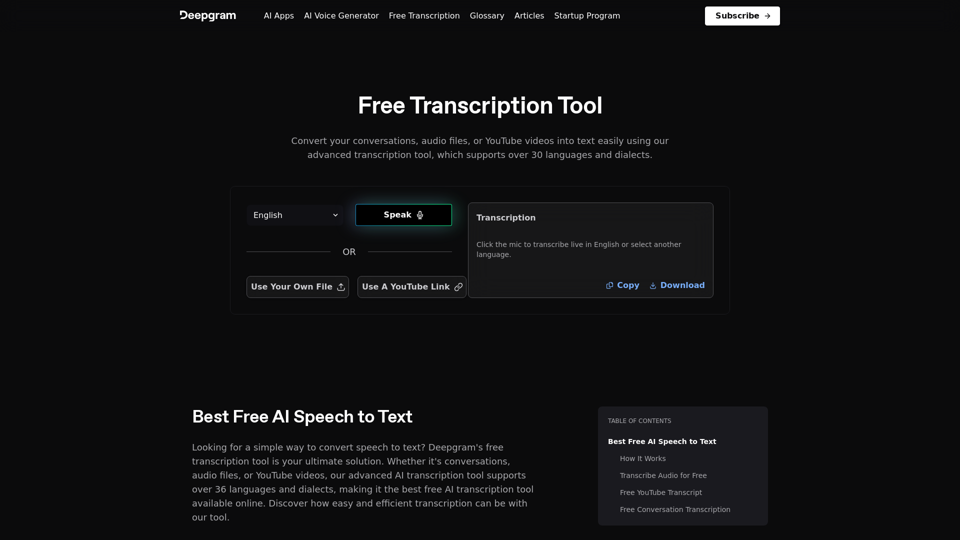
Introduction
Feature
Multi-Language Support
- Over 30 languages and dialects available
- Includes English, Spanish, French, Chinese, and many more
- Caters to a diverse global user base
Advanced AI Technology
- Ensures accurate and reliable transcriptions
- Ideal for professional use in various fields
- Handles complex audio content effectively
User-Friendly Interface
- Select language
- Choose input method (speak, upload audio, or YouTube link)
- Obtain transcript instantly
Versatile Input Options
- Live speech transcription
- Audio file upload
- YouTube video transcription
Free and Ad-Free Service
- No hidden costs or charges
- Ad-free experience for uninterrupted use
- Accessible to all users without financial barriers
Flexible Output Options
- Copy text to clipboard
- Download transcript as .txt file
- Easy integration with other applications
FAQ
Is Deepgram's transcription tool really free?
Yes, the Deepgram AI Transcription Tool is completely free to use. There are no hidden costs, charges, or advertisements, providing users with a seamless and straightforward transcription experience.
How many languages does Deepgram support?
Deepgram supports over 30 languages and dialects, making it a versatile tool for users around the world. This wide range of language options allows for diverse applications in various fields and regions.
Can I use Deepgram for live transcription?
Yes, Deepgram's AI Transcription Tool allows you to transcribe live conversations in real-time. This feature is particularly useful for meetings, interviews, or any situation where immediate text conversion is needed.
What are the input methods available for transcription?
Deepgram offers three main input methods:
- Live speech: Click the 'Speak' button to start transcribing in real-time
- Audio file upload: Convert pre-recorded audio files into text
- YouTube link: Transcribe the audio from YouTube videos directly
Latest Traffic Insights
Monthly Visits
835.16 K
Bounce Rate
40.51%
Pages Per Visit
3.47
Time on Site(s)
175.97
Global Rank
57205
Country Rank
United States 66140
Recent Visits
Traffic Sources
- Social Media:1.88%
- Paid Referrals:0.67%
- Email:0.08%
- Referrals:6.09%
- Search Engines:53.23%
- Direct:38.06%
Related Websites

Moonidea AI-powered SaaS idea generation using Reddit threads.
Moonidea AI-powered SaaS idea generation using Reddit threads.Moonidea is an AI-powered software-as-a-service (SaaS) idea generation platform. It uses Reddit discussions to find real-world problems that could be solved by creating a new SaaS product.
0
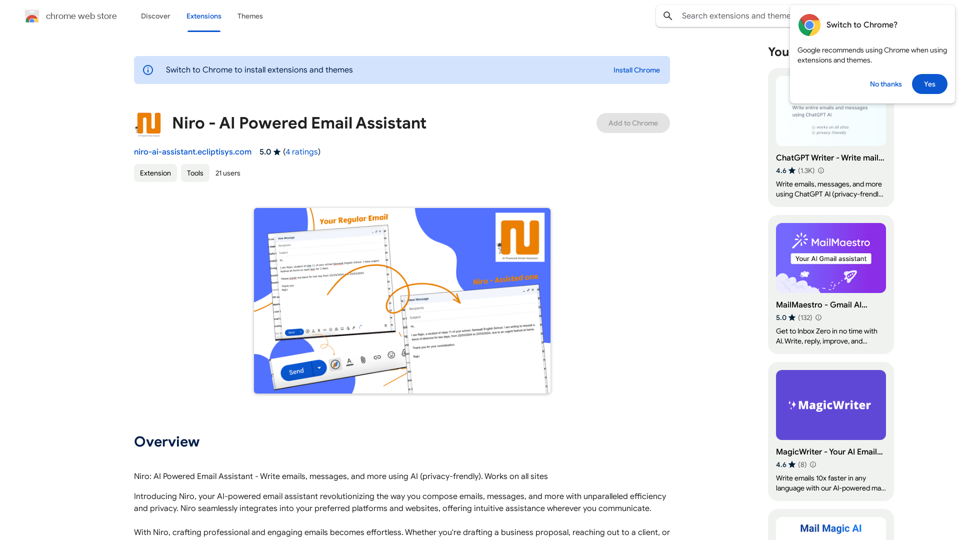
Niro: AI Powered Email Assistant - Write emails, messages, and more using AI (privacy-friendly). Works on all sites
193.90 M
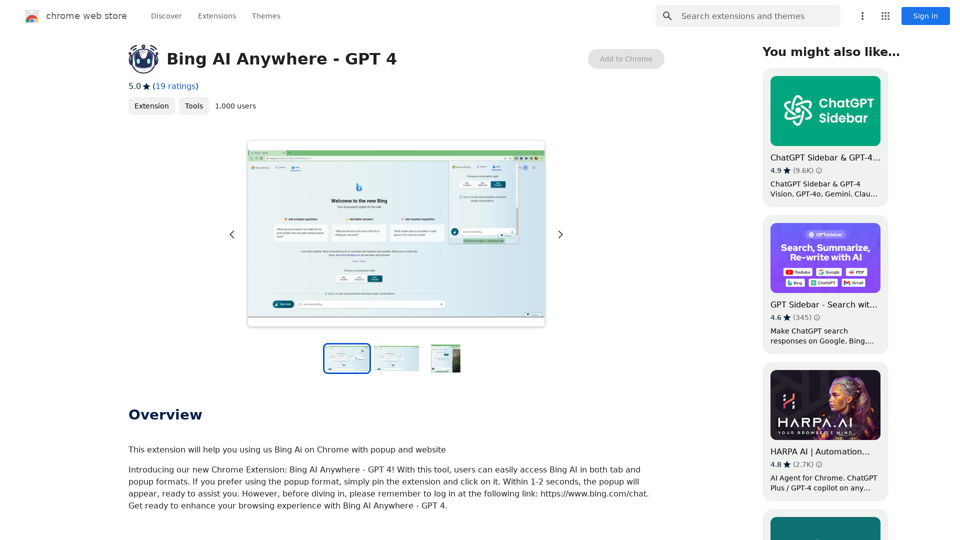
Bing AI Anywhere - GPT 4 Bing AI Anywhere is a cutting-edge technology that integrates the power of artificial intelligence into various aspects of our daily lives. With the latest GPT-4 model, this innovative platform is poised to revolutionize the way we interact, work, and live. What is GPT-4? GPT-4 is the fourth generation of the Generative Pre-trained Transformer (GPT) model, a type of artificial intelligence language model developed by OpenAI. This advanced language model is trained on a massive dataset of text from the internet and can generate human-like language, making it an ideal tool for a wide range of applications. Key Features of Bing AI Anywhere with GPT-4 * Conversational AI: Engage in natural-sounding conversations with Bing AI Anywhere, which can understand and respond to voice or text inputs. * Contextual Understanding: GPT-4's advanced language model enables Bing AI Anywhere to comprehend context, nuances, and subtleties of language, making interactions more human-like. * Multitasking: This technology can handle multiple tasks simultaneously, making it an efficient and productive tool for various industries and applications. * Personalization: Bing AI Anywhere with GPT-4 can learn and adapt to individual preferences, providing a tailored experience for each user. Potential Applications of Bing AI Anywhere with GPT-4 * Virtual Assistants: Integrate Bing AI Anywhere into virtual assistants to create more conversational and helpful AI-powered companions. * Customer Service: Implement this technology in customer service platforms to provide 24/7 support and improve customer satisfaction. * Healthcare: Utilize Bing AI Anywhere with GPT-4 to develop AI-powered chatbots that can assist with medical inquiries, appointments, and more. * Education: Create interactive and engaging educational tools that can provide personalized learning experiences for students. The Future of AI with Bing AI Anywhere and GPT-4 As Bing AI Anywhere continues to evolve with the power of GPT-4, we can expect to see even more innovative applications and use cases emerge. This technology has the potential to transform industries, revolutionize the way we work and live, and bring us closer to a future where humans and AI collaborate seamlessly.
Bing AI Anywhere - GPT 4 Bing AI Anywhere is a cutting-edge technology that integrates the power of artificial intelligence into various aspects of our daily lives. With the latest GPT-4 model, this innovative platform is poised to revolutionize the way we interact, work, and live. What is GPT-4? GPT-4 is the fourth generation of the Generative Pre-trained Transformer (GPT) model, a type of artificial intelligence language model developed by OpenAI. This advanced language model is trained on a massive dataset of text from the internet and can generate human-like language, making it an ideal tool for a wide range of applications. Key Features of Bing AI Anywhere with GPT-4 * Conversational AI: Engage in natural-sounding conversations with Bing AI Anywhere, which can understand and respond to voice or text inputs. * Contextual Understanding: GPT-4's advanced language model enables Bing AI Anywhere to comprehend context, nuances, and subtleties of language, making interactions more human-like. * Multitasking: This technology can handle multiple tasks simultaneously, making it an efficient and productive tool for various industries and applications. * Personalization: Bing AI Anywhere with GPT-4 can learn and adapt to individual preferences, providing a tailored experience for each user. Potential Applications of Bing AI Anywhere with GPT-4 * Virtual Assistants: Integrate Bing AI Anywhere into virtual assistants to create more conversational and helpful AI-powered companions. * Customer Service: Implement this technology in customer service platforms to provide 24/7 support and improve customer satisfaction. * Healthcare: Utilize Bing AI Anywhere with GPT-4 to develop AI-powered chatbots that can assist with medical inquiries, appointments, and more. * Education: Create interactive and engaging educational tools that can provide personalized learning experiences for students. The Future of AI with Bing AI Anywhere and GPT-4 As Bing AI Anywhere continues to evolve with the power of GPT-4, we can expect to see even more innovative applications and use cases emerge. This technology has the potential to transform industries, revolutionize the way we work and live, and bring us closer to a future where humans and AI collaborate seamlessly.This extension helps you use Bing AI on Chrome with a popup and website.
193.90 M
